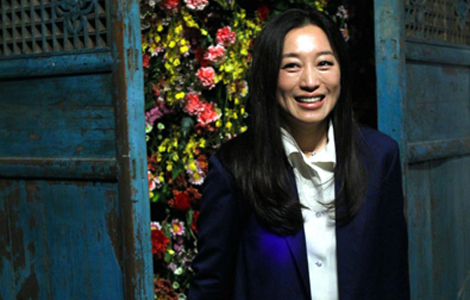
![American James Spear believes it was his destiny to settle in China. [Photo/Provided to China Daily] Great wall conversion](../../images/attachement/jpg/site1/20121202/0023ae9885da1224fc2858.jpg) |
|
American James Spear believes it was his destiny to settle in China. [Photo/Provided to China Daily] |
American James Spear had a dream of settling down by Beijing's Great Wall, says Wang Xiaodong. Today, he also runs several businesses in the area too.
Most people visit the Great Wall to admire it, but one American has gone a step further by settling down nearby and setting up a business.
"My dream was to have a house at the Great Wall," says 57-year-old James Spear, who lives in Mutianyu village, a northern suburb of Beijing.
Here and in two nearby villages he owns several hotels and restaurants.
"I feel very fortunate to be tolerated and welcome by villagers in such insular places."
For Spear, settling in China was his destiny. As a University of California, Berkeley student he was sent on a summer program to Peking University in 1981.
After he returned to the US he met a Chinese student from Beijing also studying at Berkeley, who later became his wife.
"She was my Chinese tutor at Berkeley and I wanted to ask her to go out with me on a date," Spear says. "I kept on asking her but she said, `Let's just keep it a teacher and student relationship'," Spear says in fluent Chinese.
Eventually Tang Liang relented and they have now been together for 30 years.
After finishing his master's degree, Spear and his wife joined a consultancy company, which sent them to its Beijing branch office in 1986.
Spear often visited the Great Wall, as its magnificence fascinated him.
"Beijing is a very big, crowded city. At that time our children were still little so we were looking for a place in the countryside where they could enjoy fresh air, blue sky and mountains, and especially, the Great Wall," Spear recalls.
But it was not an easy move to make.
"When I first moved to China it was not nearly as economically developed as it is today," he says.
"Society was much more closed and there were a lot of restrictions on where foreigners could travel and live. So I always wanted a place in the countryside but I did not think it would be possible. But this is a wonderful country, and it turns out that lots of things are possible."
So, in 1994, as Spear was visiting the Mutianyu section of the Great Wall, he met a villager selling souvenirs.
"I said I didn't want to buy anything but (told him) you are so lucky to live in such a beautiful place. I told him, as a foreigner, my dream has always been to have a house at the Great Wall."
The souvenir seller, Li Lianting, surprisingly turned out to have a property to lease, which became a weekend retreat for Spear and his family.
Now Li owns a company that provides services for Spear's hospitality business. "Both of us prospered," Spear comments.
Spear started a trading and business advisory company, was cofounder of a wine distribution company, and worked at a US medical company for 10 years, until he quit in 2005 to start his own business with another couple, leasing an abandoned primary school in Mutianyu village, turning it into a hotel called the Schoolhouse.
It has become a popular destination for Chinese and foreign tourists alike.
"I heard of the place from my friends. It's a nice place and the food is especially good," says Ben Mitchell, from Australia.
Spear says his business philosophy is "sustainability".
"We hire local people, grow our own food if at all possible, and we use existing buildings. This is part of what sustainability means to us."
In 2010 Spear leased a polluting brick and roof tile factory in the neighboring Beigou village and transformed it into another hotel.
"We have fully supported Spear and other foreigners in the village with their business ideas," says Wang Quan, head of Beigou village. "Spear has contributed a lot to Beigou village. He always has the villagers in mind and all of us respect him very much."
Spear responds: "We are part of the local community, and we want to create a destination where people from all over the world can come to have a taste of true rural life in China, such as its beautiful villages and craftsmanship," Spear says.
Contact the writer at wangxiaodong@chinadaily.com.cn.







